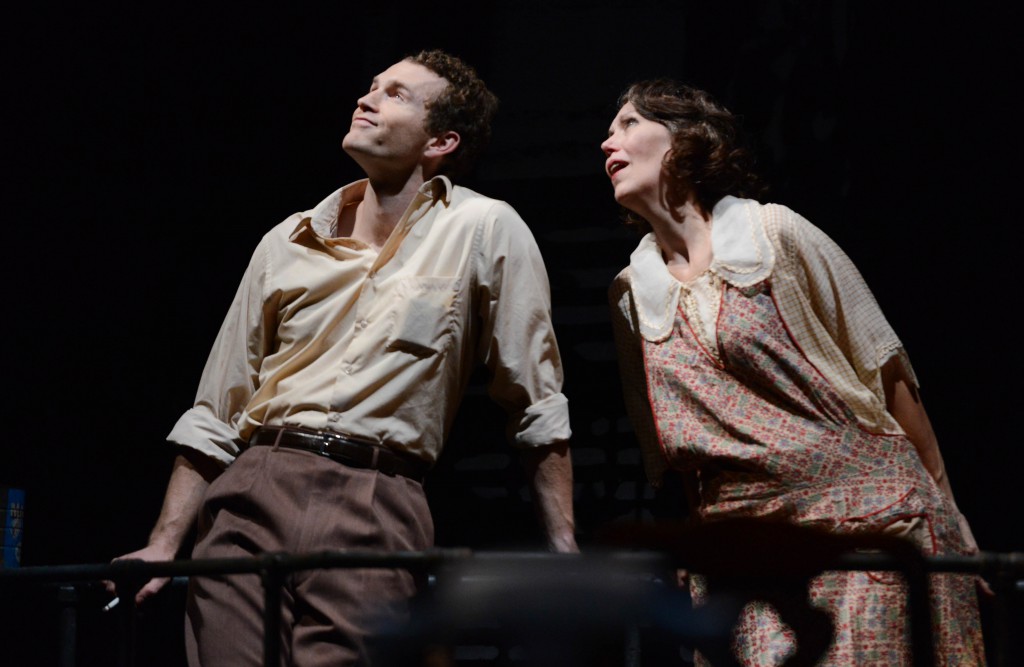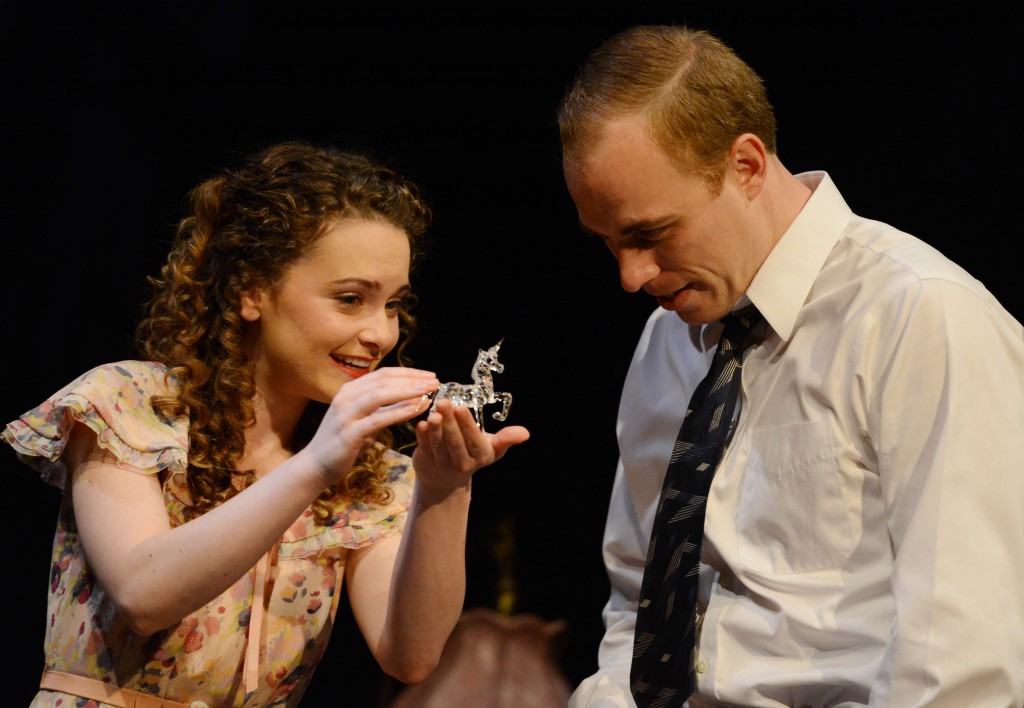Amid the Fanfare, ‘Menagerie’ Is Quietly Moving
- Like
- Digg
- Del
- Tumblr
- VKontakte
- Buffer
- Love This
- Odnoklassniki
- Meneame
- Blogger
- Amazon
- Yahoo Mail
- Gmail
- AOL
- Newsvine
- HackerNews
- Evernote
- MySpace
- Mail.ru
- Viadeo
- Line
- Comments
- Yummly
- SMS
- Viber
- Telegram
- Subscribe
- Skype
- Facebook Messenger
- Kakao
- LiveJournal
- Yammer
- Edgar
- Fintel
- Mix
- Instapaper
- Copy Link
In theater as in life, it is often better to be pleasantly surprised than to have great expectations. There are times when you see a play that’s had little advance buzz, by a playwright you’ve never heard of—and it knocks your mind’s socks off. This is theater that we all treasure, when the spell cast by the story is enhanced by the delight of discovery.
But hidden gems are rare. The question is how to maintain the precious sense of discovery when seeing a play that’s already lauded as a crown jewel, one so widely known that many of us have written papers about it. I think the best bet is to trick yourself into playing dumb. Ignore the hype. Let go of everything you’ve heard or think you know. Just pretend you’re about to watch Play X, written by Nobody Famous…and see what happens.
A play that invites this approach is Pittsburgh Public Theater’s revival of The Glass Menagerie, which has opened with great fanfare. Chosen to kick off The Public’s much-touted 40th anniversary season, it was also the first play ever produced by the theater.
More significantly, The Glass Menagerie was a landmark work in Tennessee Williams’ career. When it dazzled audiences on Broadway in 1945, it became his first big hit after years of struggle, and it is still known as his most autobiographical play. Williams wrote Menagerie in his early 30s, drawing freely from (and in some places not even fictionalizing) the misadventures of his young life and deeply troubled family.
Given the hoopla—plus Williams’ reputation as a human tempest—someone who hasn’t seen The Glass Menagerie might expect a play of thunderous intensity, loaded with psycho-dramatic fireworks that send you reeling into the night.
Uh-uh. The play is good, but not in that way. Nor does the Public’s fine production ham it up. It’s a different kind of play entirely.
The Glass Menagerie doesn’t stagger you with knockout punches so much as it sneaks up on you. Although a couple of characters have noisy tirades, what’s brewing is a quiet storm. And though the play’s psychological and social implications are plainly spelled out, never do they flood the stage with a heavy, message-y feel. The implications are injected gradually, as if by a psycho-I.V., so that their combined effects slowly ripple through your veins.
Living on the Brink
The Glass Menagerie is set late in the Great Depression, during 1937, in a St. Louis apartment where three adult members of the Wingfield family live in intimate disharmony.
Young Tom (played by Fisher Neal) holds a dreary menial job at a shoe-factory warehouse; he keeps his spirits up by catting around at night and dreaming of the day when his desire to write will make him a great poet. Sister Laura (Cathryn Wake), a shy recluse whose hobbled foot causes her to limp, is trapped by a hobbled soul. She seems unable to pursue any dream beyond playing with her collection of tiny glass animals: the menagerie of the title.
And mother Amanda (Lynne Wintersteller) is the hen who pecks the unlucky pair. In today’s language she might be called a helicopter mom—the kind who hovers and snoops in her efforts to micromanage—except there is more to her story.

Out on the fire escape, Tom (Fisher Neal) is just moongazing while Amanda (Lynne Wintersteller) scans the sky anxiously for signs of a better future.
Amanda is both the play’s chief comic relief and a tragic figure. Her constant disjointed chatter can be hilarious, yet weirdly on-target, as in a lecture to son Tom: “You are the only young man that I know of who ignores the fact that the future becomes the present, the present the past, and the past turns into everlasting regret if you don’t plan for it!”
Amanda herself lives a life shadowed by regret. Raised to be a genteel Southern belle who marries into money, instead she married a man who has fled the coop, leaving her penniless. So what can she do? Why, what else but help her pretty little Laura find an ideal husband?
That appears to be a hopeless endeavor, like waiting for Godot, until a proto-Godot actually shows up.
White Knights and Soft Power
The candidate is Tom’s work buddy Jim (Jordan Whalen), a veritable shining knight of the Depression era. In a time that has dashed many people’s dreams, Jim strives on cheerfully. He believes in positive thinking. He takes night courses. And he’s a nice guy who takes a sincere interest in Laura. The play’s apex is a long, delicate scene in which he tries to coax the menagerie girl from her shell.
I won’t reveal the outcome, and The Glass Menagerie leaves a number of things unresolved anyway. One resolution it did achieve on the night I attended, though, was to deliver a soft-power knockout in the end. The audience, which had been mostly silent—even hesitating to laugh at the funny parts—rose in a standing ovation.
Again, it sneaks up on you. A script that at times seems slow-moving, by modern standards, turns out to be artfully conceived. The actors bring it to life, and perhaps because I’m a guy, I particularly liked the men. Fisher Neal mixes laid-back eloquence with bursts of passion in a convincing portrayal of Tom, the character who represents the playwright. (Tennessee Williams’ given name was Thomas and he really worked in that shoe factory). The Jim character could come across as stereotypical if he wasn’t given the tricky blend of energetic nuance that Jordan Whalen brings to the part.
Finally, there’s another nice blending of nuances at work. The Glass Menagerie paints a picture of the strange and tricky balances that people everywhere, in all times, try to strike to give their lives meaning.
At least that’s how the play struck me. See what you can discover.
Closing Credits and Ticket Info
The Glass Menagerie, by Tennessee Williams, is directed for Pittsburgh Public Theater by Pamela Berlin. She and the women in the cast, along with the aforementioned men, do justice to the play, which runs through Nov. 2. Visit The Public for show times and tickets. O’Reilly Theater, 621 Penn Ave., Cultural District.
Photos courtesy of Pittsburgh Public Theater
Mike Vargo, a freelance writer and editor based in Pittsburgh, covers theater for Entertainment Central.
Share on Social Media
- Like
- Digg
- Del
- Tumblr
- VKontakte
- Buffer
- Love This
- Odnoklassniki
- Meneame
- Blogger
- Amazon
- Yahoo Mail
- Gmail
- AOL
- Newsvine
- HackerNews
- Evernote
- MySpace
- Mail.ru
- Viadeo
- Line
- Comments
- Yummly
- SMS
- Viber
- Telegram
- Subscribe
- Skype
- Facebook Messenger
- Kakao
- LiveJournal
- Yammer
- Edgar
- Fintel
- Mix
- Instapaper
- Copy Link
Follow Entertainment Central
Sign up for the EC Newsletter
Latest Stories








